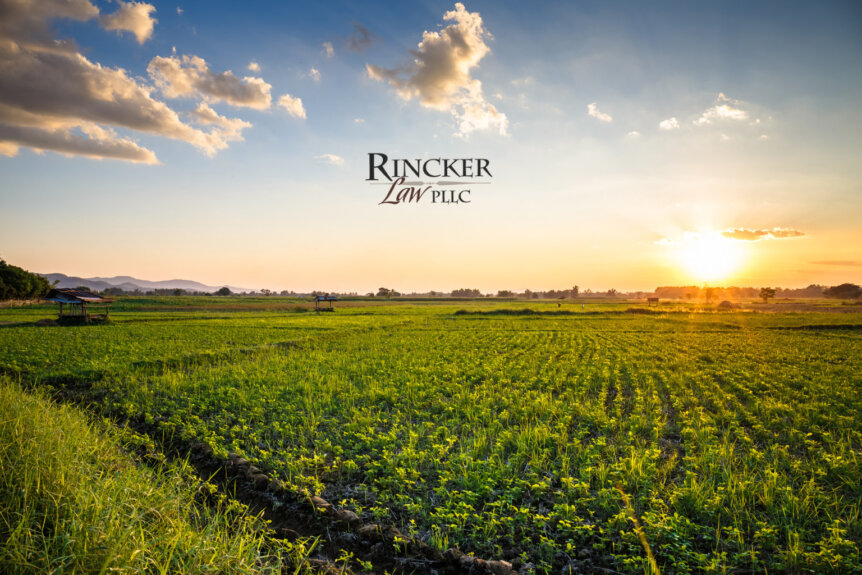The relationship between landowners and tenants is at the heart of many agricultural operations. Illinois farm leases define how farmland is used, who bears the risks, and how profits are shared. Whether you’re a landowner looking to protect your property or a farmer wanting fair terms, understanding farm leases in Illinois is essential. In this blog, we share the most common types of leases, key clauses to include, and legal considerations for both sides.
What Are the Common Types of Farm Leases in Illinois?
Illinois farmers and landowners typically use one of four primary lease types:
- Cash Rent Lease
- Tenant pays the landowner a fixed amount of rent per acre.
- Simple to manage but shifts risk to the tenant if yields or prices fall.
- Important to specify payment dates, default remedies, and renewal terms.
- Crop Share Lease
- Landowner and tenant share input costs (seed, fertilizer, chemicals) and crop revenues.
- Requires detailed agreements on who handles marketing, storage, and sales.
- Risk and reward are shared, but disputes may arise without clear terms.
- Hybrid or Flexible Lease
- Combines cash rent with a share of crop income.
- Provides stability for landowners while aligning tenant incentives.
- Often tied to market prices or yields.
- Grazing Lease
- Common for livestock operations.
- Defines permitted livestock, stocking rates, fencing responsibilities, and liability for damage.
- Should also address insurance requirements and water access.
What Should Be Included in a Farm Lease Agreement?
A strong Illinois farm lease should be written, signed, and detailed. Key provisions include:
- Names of parties and legal description of land.
- Lease term and renewal process (fixed vs. year-to-year).
- Rent amount, due dates, and method of payment.
- Responsibility for inputs such as seed, fertilizer, and pesticides.
- Conservation practices (soil health, drainage, erosion control).
- Maintenance and improvements (tile drainage, buildings, fences).
- Insurance requirements (liability, crop insurance).
- Termination and notice requirements under Illinois law.
Having a written agreement avoids disputes, protects both parties, and ensures compliance with Illinois statutes.
What Are the Notice Requirements for Terminating a Farm Lease in Illinois?
Under Illinois law, most oral farm leases are treated as year-to-year leases. To terminate:
- Written notice must generally be given at least 4 months before the end of the lease year.
- For most farm leases, this means notice must be provided by November 1 to end the lease on March 1 of the following year.
Failure to give timely notice can automatically renew the lease for another year. This deadline is one of the most important legal requirements for Illinois farm leases.
How Are Farm Lease Disputes Resolved?
Most conflicts can be avoided with a clear written agreement, but when they occur, options include:
- Negotiation and mediation (Illinois participates in the USDA Certified Mediation Program for agricultural disputes).
- Court litigation if mediation fails.
- Arbitration, if the lease specifies it.
Common Causes of Farm Lease Disputes
Disputes can arise over:
- Unpaid rent or late payments.
- Land damage or failure to follow conservation practices.
- Disagreements about crop share percentages or expense contributions.
- Termination and renewal disputes.
What Are the Tax Considerations for Illinois Farm Leases?
Farm leases can impact both income and property taxes:
- Cash rent is taxed as ordinary rental income.
- Crop share income may qualify as self-employment income for the tenant.
- Property tax assessments remain the landowner’s responsibility, but lease terms can allocate costs.
- Some lease arrangements may also affect eligibility for USDA farm programs or crop insurance coverage.
Consulting with both a lawyer and a tax professional ensures compliance and minimizes surprises.
FAQs About Illinois Farm Leases
- Are oral farm leases enforceable in Illinois?
Yes, but they are legally treated as year-to-year leases and are harder to prove in court compared to written agreements. - Can a farm lease be terminated mid-season?
Generally, no—unless the lease specifically provides for early termination or there has been a major breach, such as non-payment of rent. - Who pays for improvements like drainage tile or new fencing?
This depends on the lease. Many agreements require tenant approval from the landowner before improvements are made. - Do farm leases need to be recorded?
Recording is not required but may be beneficial for long-term leases to protect tenant rights. - Can farm leases be inherited or assigned?
Some leases allow transfer to heirs or assignment with consent. Always check the lease language.
Are You a Farm Business That Needs Assistance With Farm Leases in Illinois?
Farm leases are more than just paperwork, they are the foundation of agricultural relationships. Whether you are a landowner seeking to protect your investment or a tenant securing your livelihood, a well-drafted Illinois farm lease provides clarity, fairness, and legal protection.
If you are negotiating or reviewing a farm lease, or if a dispute has already arisen, contact Rincker Law PLLC at (217) 774-1373. Our team understands the unique challenges of Illinois agriculture and can help protect your land, your business, and your future.

